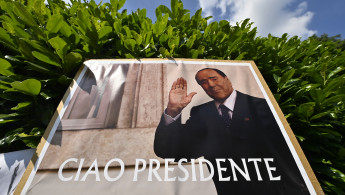Silvio Berlusconi: Late Italian PM’s ties to Palestine, Syria, Iraq, Libya
Silvio Berlusconi, a billionaire media tycoon and former Italian Prime Minister, died on Monday at the age of 86.
He served as the head of Italy's government four times from 1994 to 2011, before being ousted from power.
He held some extremely controversial opinions that rubbed much of the world up the wrong way — including when he claimed Western civilisation was "superior" to Islamic culture.
Here are some of Berlusconi’s most famous takes on the Middle Eastern and North African affairs.
Israel/Palestine
Berlusconi was a staunch supporter of Israel, a country he claimed was the only democracy in the Middle East.
He said he would not recognise a Palestinian state founded without Israeli agreement, and backed Israel’s plan for a demilitarised Palestinian state.
Despite his lack of support for an independent and sovereign Palestine, he and late Palestinian leader Yasser Arafat appeared to agree on some issues.
Pages from what were purportedly Yasser Arafat’s secret diaries leaked in 2018 revealed that when Berlusconi was on trial accused of funding the Italian Socialist Party, Arafat met in secret with the longtime Italian prime minister about falsely testifying in court regarding Berlusconi’s dealings in order to receive a substantial amount of money.
Arafat had falsely testified in 1998 that the roughly €5 million at the centre of the trial were not destined for the Italian Socialist Party but for the Palestine Liberation Organisation (PLO) that he led, according to the diaries.
Gaddafi’s Libya
Berlusconi was famously friendly with Muammar Gaddafi, who led Libya until he was removed from power in 2011.
The two leaders inaugurated an underwater gas pipeline running between their countries in 2004, and Libya was Italy’s largest oil supplier during their rule.
Italy invested billions in Libya during the latter days of Gaddafi's rule — some as compensation for Italy’s colonial rule of Libya in the early 20th century.
Berlusconi appeared to almost revere the Libyan dictator. Gaddafi was given VIP treatment when he visited Italy, and the Italian PM famously kissed Gaddafi’s hand at an Arab League summit in Sirte in 2010.
Italy is a member state of NATO, which intervened to oust Gaddafi from power in 2011. Berlusconi said he was against NATO intervention in Libya to remove Gaddafi, but felt pressured to go along with it.
Syria
Berlusconi condemned Bashar al-Assad’s deadly crackdown on protesters in the spring of 2011.
However, he later endorsed Russian President Vladimir Putin’s military intervention in Syria, which has helped Assad maintain his hold on Syria after 12 years of war.
Iraq War
Berlusconi backed the US-led invasion of Iraq in 2003, contributing troops to the coalition. He said the invasion was a necessary example of the West exporting freedom.
He courted controversy in 2004 when instead of visiting Italian troops serving in Iraq, he got a facelift.
He later said that he had tried to talk US President George Bush out of a military intervention in Iraq.
"I wanted to try to change [George W] Bush’s mind. I was looking for an alternative to the invasion of Iraq. I was trying to think of a country in which Saddam could go into exile, a way out in order to avoid war," he was quoted as saying in a biography published in 2015.
The Moroccan belly dancer, or 'President Mubarak’s granddaughter'
Berlusconi was convicted in 2013 of paying a child for sex and for abuse of office after using his position to free her from jail.
Karima El Mahroug, who moved with her family from Morocco to Italy when she was nine or ten years old, met Berlusconi at a party, after one of his friends spotted her in a nightclub and introduced them. El Mahroug was 17 at the time, and worked as a belly dancer.
Their relationship became known when El Mahroug was arrested by police in Milan on a charge of theft, but was released after a phone call from the prime minister himself.
Berlusconi told police that El Mahroug she was a grand-daughter or niece of then Egyptian President Hosni Mubarak, demanding she be freed to avoid a diplomatic incident.
When on trial, he told the court that he believed at the time that El Mahroug was indeed a relative of Mubarak.





 Follow the Middle East's top stories in English at The New Arab on Google News
Follow the Middle East's top stories in English at The New Arab on Google News


